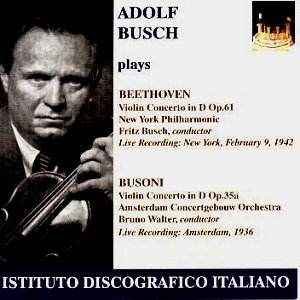These performances have been in the catalogues before.
The Busoni is on Music & Arts CD861 coupled with the Beethoven Romances
and the Brahms Double Concerto (Iíve not heard the transfer). The Beethoven
Concerto Iím less certain about (perhaps a reader can fill in the gaps).
My copy is from a Brüder-Busch-Gesellschaft LP but itís doubtless
made an appearance or two on CD. Coupling them on one CD does certainly
make for an interesting conjunction though. One small point; the rather
high-sounding Instituto Discografico Italiano claim the Beethoven is
a "Live Recording" (as the Busoni most certainly is) but itís
not. Itís an unissued commercial Columbia set recorded in New York.
It was suppressed, I believe, by the violinist who took exception to
the unacceptable balance between violin and orchestra. Maybe uniquely
for a violinist, Busch objected that the violin was too forward in
the balance, not a consideration that overly troubled, say, Jascha Heifetz.
There are tremendous qualities in the performance to
which I respond with genuine admiration. That said it would be foolish
to pretend that however moving it is there are not also a number of
deficiencies. Buschís broken octaves sound effortful to my ears and
tentative; his intonation is also not always secure. The sense of strain
that he imparts to the line - and in this he is aided by his brother
Fritz Ė is arguably an architectural-expressive component of his conception,
but some of the passagework is less than ideally determined. His musical
shaping in the first movement from 10.00 onwards is marvelously expressive
however, even though I find his subsequent phrasing (from about 12.00)
less convincing. It is in the Larghetto that he really illumines the
performance; few can match him for rapt intensity and concentratedness,
inner light. No one was less likely to skim over the surface of the
music here than Busch. The finale is not the tidiest of performances
though itís rugged and full of incidental interest (and a little bit
of orchestral congestion). But Busch seems to gain here in elegance
and eloquence as the movement develops and thereís assuredly much to
admire.
There are some acetate thumps in the Busoni Concerto
recorded in Amsterdam in 1936 with Bruno Walter on the rostrum. The
sense of dim sounding acetates proves only partially correct, though,
as the sound soon sharpens and ones ear adjusts (though worrying side
joins remain). It is essentially an acceptable sound picture and manages
to catches something of Buschís much-argued-over tone. The gorgeously
rhapsodic opening (Brahmsian with superior solo trilling allusions to
Beethoven) is splendidly delineated by Busch and Walter. The Quasi
andante section (this one movement twenty-two minute work is divided
into standard fast-slowish-fast sections) is expressive and rich and
the fluttering Allegro impetuoso shows us Buschís good bowing and shifts,
his wit and direction (if a little unsteady in passagework) but above
all a rightness of conception that does much for this still seldom performed
work.
Notes and production are serviceable and admirers of
the violinist will require both works Ė if they donít already have them
elsewhere.
Jonathan Woolf

